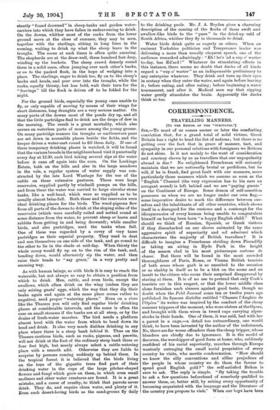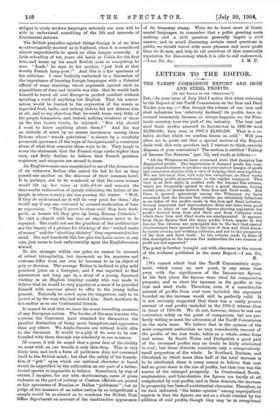TRAVELLING MANNERS.
ITO TUB EDITOR 01P THB "SPECTATOR."] Sin,—To 'nest of us comes sooner or later the comforting conviction that, for a grand total of solid virtues, Great Britain has a right to head the list of nations ; but there is no getting over• the fact that in grace of manner, tact, and sympathy in our personal relations with foreigners we Britons do not shine. Is it not mainly to the want of consideration and courtesy shown by us as travellers that our unpopularity abroad is due ? No enlightened Frenchman will seriously maintain that we are nationally brutal or perfidious, but he will, if he is frank, find great fault with our manners, more particularly those manners which we assume as soon as the "English " Channel (the very, expression has to his ears an arrogant sound) is left behind and we are " paying guests " on the Continent of Europe. Some demon of self-assertion possesses us when we are no longer under our own flag,— some imperative desire to mark the difference between our- selves and the inhabitants of all other countries, which shows itself in a disregard for the customs and a contempt for the idiosyncrasies of every human being unable to congratulate himself on having been born "a happy English child." What should we think of Russian, Spanish, or Greek visitors if they disembarked on our shores animated by the same aggressive spirit of superiority and nil admirari which characterises the majority of British travellers ? It is difficult to imagine a Frenchman striding down Piccadilly or taking an airing in Hyde Park in the height of the season clad in his most picturesque costume de chasse. But there will be found in the most crowded thoroughfares of Paris, Rome, or Vienna British tourists of both sexes whose garb is so unsuited to the occasion or so shabby in itself as to be a blot on the scene and an insult to the citizen who earns their surprised disapproval by staring at them. It is of no use to pretend that only Cook's tourists err in this respect, or that the lower middle class alone furnishes such sinners against good taste, though no doubt when the Petit Journal some ten or twelve years ago published its famous diatribe entitled " Chassez l'Anglais de rOpera " its writer• was inspired by the conduct of the cheap summer trippers of the moment, who wore ulsters at the Opera, and brought with them wives in tweed caps carrying alpen- stocks in their hands. One of them, it was said, had with her a parrot in a cage,—a detail too extraordinary, one would think, to have been invented by the author of the indictment. No, there are far worse offenders than the cheap tripper•, whose blunders are chiefly due to ignorance. It is the model of decorum, the worshipper of good form at home, who, sublimely confident of his racial superiority, marches through Europe wantonly outraging the small social proprieties of every country he visits, who merits condemnation. "How should we know the silly conventions and sillier prejudices of the people in whose country we do them the favour to spend good English gold ? " the self-satisfied Briton is sure to ask. The reply is simple. " By taking the trouble to ask a few questions beforehand of somebody qualified to answer them, or, better still, by seizing every opportunity of becoming acquainted with the language and the literature of the country you propose to visit?' When our boys Lave beep
obliged to study modern languages seriously our men will be able to understand something of the life and interests of Continental nations.
The British prejudice against things foreign is at no time so extravagantly marked as in boyhood, when it is considered almost unpardonable to speak an alien tongue correctly. A little schoolboy of ten years old lands at Calais for the first time and turns up his small British nose at everything he sees. " Look," he says to his mother, " just look at that beastly French lamp-post I" And this is a fair specimen of his criticism. I once foolishly embarked in a. discussion of the importance of learning foreign languages with a Colonial official of some standing, whose argument against such an expenditure of time and trouble was this : that be would back himself to travel all over Europe in perfect comfort without speaking a word of anything but English. That his conver- sation would be limited to the expression of his wants as regarded food, baths, and railway tickets did not distress him at all; and to my objection that he could learn very little of the people themselves, and, indeed, nothing whatever of those on the less beaten tracks, he rejoined : "But why should I want to know anything about them ? " And his was an attitude of mind by no means uncommon among those Britons whose "sturdy patriotism" is shown by a carefully preserved ignorance of the ways of foreigners and a consistent abuse of what they conceive those ways to be. They laugh to scorn the statement that the French stage ranks higher than ours, and flatly decline to believe that French painters, engineers, and surgeons are second to none.
An Englishwoman once complained to me of the forwardness of an unknown Italian who raised his hat to her as they passed one another on the staircase of their common hotel. It is, perhaps, not to be wondered at that the same woman would lift up her voice at table-d'heite and commit the inexcusable indiscretion of openly criticising the habits of the people in whose country she was passing the winter. " Well, if they do understand me it will be very good for them," she would say if any one ventured to counsel moderation of tone or expression. " They'll never be clean until they have back- yards, or honest till they give up being Roman Catholics." To visit a church with her was an experience never to be repeated. She could not see the grandeur of the architecture nor the beauty of a picture for thinking of the " wicked waste of money " and the " shocking idolatry " they represented to her mind. She and hundreds like her give the Latin races, at any rate, just oause to look unfavourably upon the Englishwoman abroad.
To the stranger within our gates we cannot be accused of actual inhospitality, but insomuch as his manners and customs differ from our own he becomes to us an object of pity or derision. The average Briton is inclined to play mild practical jokes on a foreigner, and I was expected to find amusement not long ago in a story of a young Spaniard visiting in an English hunting county .who was made to believe that he would be very popular at a meet if he provided himself with macrons ,laces to offer to the young ladies present. Naturally he acted upon the suggestion, only to be jeered at by the man who had misled him. Such incidents do not endear us to our Continental friends.
It cannot be said that we have the worst travelling manners of any European nation. The hordes of German tourists who overrun the Continent have obtained for themselves the peculiar distinction of being more bumptious and aggressive than any others. We Anglo-Saxons are without doubt akin to the Germans. It would be a pity if we were to be con- founded with them through any similarity in our manners.
Of course, it will be urged that a great deal of the civility we meet with on our travels is only skin-deep. This is very likely true, and such a form of politeness does not commend itself to the British mind ; but that the safety of the founda- tion of "grit" upon which our national character is based would be imperilled by the cultivation on our part of a better- rooted species is impossible to believe. Sometimes, by way of excuse, I imagine, for our own shortcomings, cases of gross rudeness on the part of railway or Custom officials are quoted as fair specimens of Russian or Italian "politeness " ; but to judge of the manners of an entire nation by so insignificant a sample would be as absurd as to condemn the British Poet Office department on account of the unattrictive appearance of its tenpenny stamp. Were we to know more of Conti- nental languages, to remember that a polite greeting costs nothing and a civil question generally begets a civil answer, and to avoid discussing certain vexed questions in public, we should travel with more pleasure and more profit than we do now, and help to rid ourselves of that unenviable reputation for dikourtesy which it is idle to call undeserved.
—I am, Sir, &c., I. M. P.







































 Previous page
Previous page